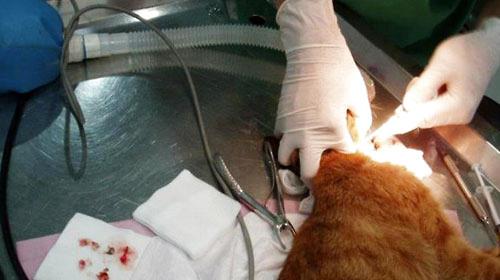Oral ulcers are also a common oral disease in cats. The veterinary community once held different opinions on the causes of oral ulcers in cats. Now it is generally believed that the deficiency of the cat's immune system is one of the causes of the disease, but there must be other factors. These factors
mouth ulcers
I. Etiology
Simple chronic gingivitis in cats is a kind of unexplained gingivitis and stomatitis, which can cause serious ulcers in cats' gums, tongue, pharynx and other parts, and conventional treatment methods often cannot be cured.
There are other chronic inflammation caused by trauma. When the cat accidentally eats wood chips, iron wire, fish hook, burr, sewing needle and other foreign objects to stab the oral cavity, causing oral inflammation or ulcer; or eating some irritating drugs or chemicals by mistake
II. Clinical symptoms
1. Cats with oral ulcers mainly have the following symptoms:
Long-term drooling, the amount of drooling is related to the severity of oral ulcers, and sometimes blood in the saliva is found, and the drooling is sticky and extremely smelly, which usually wets the hair around the mouth, forelimbs and chest;
2. According to the incidence of cat gingivitis and the type of oral lesions, cat gingivitis was divided into 4 grades.
Grade 0: normal gingiva.
Grade 1: Mild gingivitis, hyperemia can be seen in individual places on the gingival margin, and there is no tissue hyperplasia.
Grade 2: Moderate gingivitis, gingival congestion but no signs of hyperplasia and/or gingival ulceration.
Grade 3: Severe gingivitis with gingival margin hyperemia, swelling, and ulceration; periodontal disease symptoms such as periodontal pocket formation, alveolar atrophy, and loose teeth.
Grade 4: Very severe gingivitis, manifested by very severe gingival redness, hyperplasia, and/or bleeding from the entire gingival ulcer; pharyngitis, glossitis, loose teeth, and brittle and brittle gingival margins.
III. Differential diagnosis of several viral oral lesions
1. Feline herpes virus and calicivirus: These two viruses are the main causes of respiratory tract infection in cats, and accompanied by ulcerative stomatitis, painful lesions on the tongue and soft palate; when calicivirus infection,
2. Feline HIV: Chronic gingivitis and stomatitis are usually seen during infection; ulcers can occur on the tongue, gums, mucous membranes, and behind the molars, mainly due to immunosuppression; the ulcers are very painful
3. Feline distemper virus: Mainly manifested as severe gastrointestinal symptoms; oral lesions included necrotizing gingivitis, severe ulcerative glossitis, and soft palate ulcers.
4. Treatment
Symptomatic treatment is difficult to cure, and removal of necrotic roots and calculus in the oral cavity is very helpful for the improvement of the condition.
Commonly used conservative therapy drugs are as follows:
1Antibiotics: metronidazole, amoxicillin, doxycycline, etc., mainly kill oral bacteria and control secondary bacterial infection.
2 Glucocorticoids: prednisone, dexamethasone—reduces immune response, reduces further damage caused by the body's immune response, and has the purpose of anti-inflammatory and detumescence.
3Megestrol acetate: (mainly used for the treatment of advanced breast cancer and advanced endometrial cancer, and also has a certain effect on renal cancer, prostate cancer and ovarian cancer. It can also improve the appetite of patients with advanced tumors
4Levamisole: Originally, it is a kind of drug to expel roundworms, but its side effect is a very good immune enhancer.
5 Multivitamins: Nature is an essential nutrient for the body.
6thyroxine: Promote metabolism and enhance physical fitness.
7 anti-inflammatory drugs: reduce inflammation, reduce pain and redness.
8-cyclosporine: an immunosuppressant that reduces the immune response.
9Analgesic drugs: Encourage animals to eat actively after pain relief.
Surgery is generally used now, and the cure rate of surgical treatment of cats is very high, so it will not be described here.

oral surgery
V. Prevention of oral ulcers
First of all, cats should be vaccinated regularly to prevent the above-mentioned viral diseases that can cause oral ulcers; secondly, the cat's daily diet must be rich, varied and nutritious, and some meaty bones can be fed to the cat to clean it.
In the past, cat's oral ulcer was an incurable disease. Now with the development of medicine, the cure rate of cat's oral ulcer has been greatly improved.
